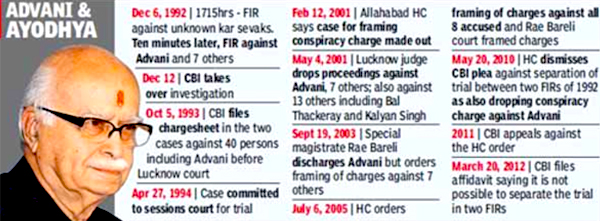New Delhi, May 7: The CBI has told the Supreme Court that it was not only against dropping of conspiracy charges against BJP leader L K Advani in the Babri Masjid demolition case but also wanted him and other leaders to face trial along with the accused kar sevaks.
In the demolition incident, two FIRs were lodged. FIR No. 197/92 was against kar sevaks who allegedly demolished the mosque while FIR No. 198/92 had named Advani, Murli Manohar Joshi, Uma Bharti, Vinay Katiyar, Ashok Singhal, Giriraj Kishore, Vishnu Hari Dalmiya and Sadhvi Rithambara for making provocative speeches to instigate kar sevaks.
The CBI in its recent affidavit said, "It is not possible to separate some of the accused persons from 197/92 because they did not have a personal hand in the actual demolition of the disputed structure and be transposed as accused in 198/92."

The agency added, "It is incorrect to state that case crime no. 197/92 and 198/92 are two different cases and facts and the place of occurrence are different. The investigations by CBI had disclosed that there was a single larger conspiracy to demolish the disputed structure on December 12, 1992 and various accused so charged in the consolidated chargesheet in all the 49 cases played their own roles in achieving the object of the said criminal conspiracy."
On Advani's role, the CBI said, "Before the demolition started and during the course of demolition, various accused persons including the eight named in the FIR of crime no. 198/92, made provocative slogans from the manch (dais) causing the assembly to turn unlawful resulting in rioting and storming of the structure by the kar sevaks."
In its 30-page affidavit, the CBI said, "As and when the domes fell, the accused leaders and others on the manch celebrated the same by clapping, hugging each other and distributed sweets on the manch which was at a visible distance of 175 metres from the disputed structure.
"All the offences of shouting of provocative slogans creating enmity between two communities, affecting national integration as well as the demolition of the structure and assault on media persons not to create (sic) record of what was going on, formed part of the same transaction and could not be separated from each other." It also quoted a February 12, 2001 judgment of the Lucknow bench of the Allahabad high court.
Through the affidavit, the CBI at one go challenged the HC's 2010 judgment putting its stamp of approval on dropping of conspiracy charges against Advani, separation of trial of the two FIRs and the dropping of charges altogether against Bal Thackeray and 12 others on the ground that they were not present in Ayodhya on December 6, 1992.





Comments
Add new comment